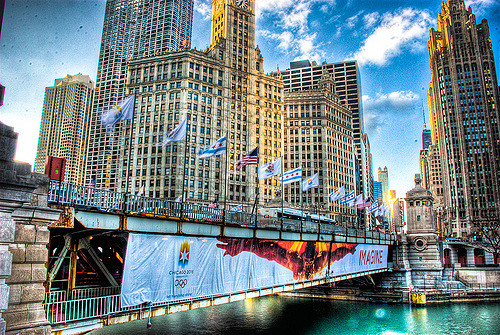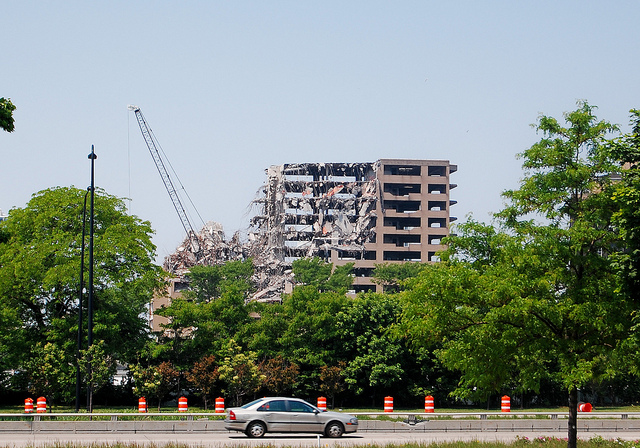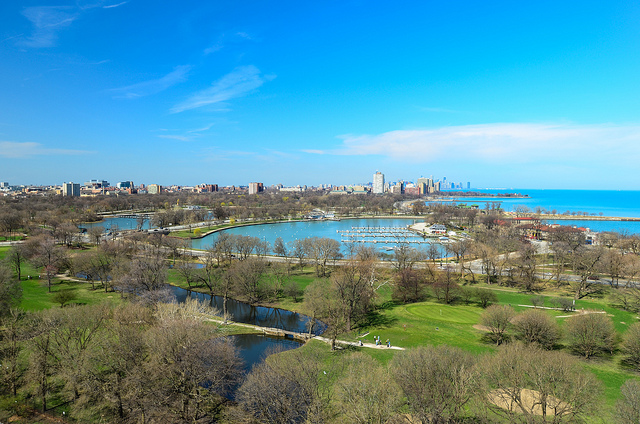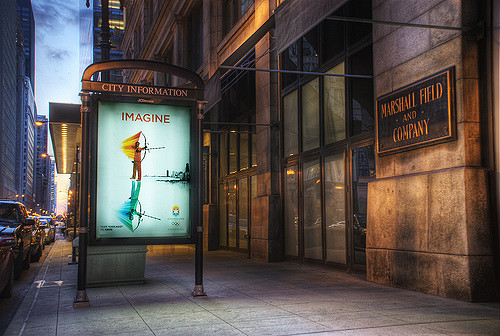Happy Tenth Anniversary To Chicago's Doomed 2016 Olympic Bid
By Chicagoist_Guest in News on May 4, 2016 3:47PM
By Emilie Shumway
It’s been just about ten years since Chicago threw its hat into the 2016 Olympics ring, launching an exploratory committee in May 2006. The bid, which became official a year later, garnered the public support of an A-List cast, including President Barack Obama and the First Lady Michelle Obama, Oprah Winfrey, and two superhuman Michaels—Jordan and Phelps.
Why Chicago?
At the time, Chicago seemed well positioned for a turn as host. We beat out Los Angeles for the U.S. Olympic Committee’s selection with our plan to capitalize on the lakefront, building sparkling new lakeside towers and transforming the marina. The committee praised Chicago’s potential to “recreate a certain magic,” and a bulk of Chicago’s starry-eyed 1-percenters agreed, signing on to bankroll and promote the project.
The plebs were a little more wary. While the 600-page plan filed by the city’s bid committee emphasized use of the city’s parks and existing infrastructure (like McCormick Place and the United Center), it included a number of ambitious development projects. Chicago would have built 15 new venues to accommodate the Games, six of which would have become permanent structures replacing valuable green space. Many of the venues would have been on the South Side, which at the time raised some concerns over Olympics-driven gentrification.
Three major South Side sites would have played key roles in Chicago’s Olympics: They are the lakefront Jackson Park, which borders the neighborhoods Woodlawn and Hyde Park; Bronzeville’s vacant and rundown Michael Reese Hospital; and Washington Park, a 372-acre, 140-year-old park with borders on some of Chicago's most blighted communities. Here’s what Chicago’s Olympics committee had in mind, and what’s happening at these sites today instead:
The Michael Reese Hospital Site
What They Planned: When the Michael Reese Hospital property was listed for sale in late 2006, the city began to eye it as a site for the Olympic Village, which early plans had put along the lake near McCormick Place. In July 2009, the city purchased the hospital site for $86 million, with plans to sell it to a developer who would build a facility there to house the 15,000 Olympic athletes. After the games, that facility would have been poised to become a mixed-use, mixed-income housing and retail development in an area that has been labelled a food- and retail-desert.
What Actually Happened: The hospital officially closed on August 31, 2009. Demolition began in 2009 and continued through 2012. Today, the lot stands cleared and vacant, with the exception of the hospital’s old psychiatric building. Nothing has been built yet, but the city is paying millions of dollars in taxes on the site until City Hall selects a developer.
Washington Park
What They Planned: The city planned to build a temporary, 80,000-seat Olympic Stadium in Washington Park, and replace it with 5,000-seat, multi-use permanent facility after the Games. There were also plans for several new swimming pools, at least one of which would have been a permanent addition to the park’s now-closed Dyett High School.
What Actually Happened: Washington Park has become a focus for new non-profit Project 120, which is developing plans to “holistically revitalize the nationally significant, complex, historic urban spaces we call the ‘South Parks.’” Dyett High School was one of several Chicago Public Schools the city closed last year in a controversial decision, despite a month-long hunger strike by dedicated parents and activists who wanted to keep it open.
Jackson Park
What They Planned: The city planned to build a temporary 15,000-seat field hockey facility in Jackson Park, which would be transformed post-Games into soccer fields.
What Actually Happened: Project 120 has been working on Jackson Park, too—and Yoko Ono will unveil a work of public art there in June.
What Chicagoans Thought About The Bid
All together, Chicago proposed a $3.8 billion, privately-funded Olympic development plan. The budget was deemed “ambitious but achievable” by the International Olympic Committee, but many Chicagoans were skeptical. Chicago Reader political columnist Ben Joravsky, one of the bid’s most vocal critics, pointed out Chicago’s tendency to under-budget when it comes to major construction projects (citing Millennium Park and Block 37, among others). The city itself guaranteed at least half a billion in costs should private fundraising fall short, making some taxpayers nervous.
Patrick G. Ryan, founder of the Aon Corporation and chairman of the 2016 bid committee, touted the opportunity to make a legacy for the city, but the public was still torn on whether Chicago should host. Opinion polls reflected 76 percent of the public supporting the bid in 2007, with that number dropping to 47 percent by September 2009, just a month out from the final vote. A blog dedicated to opposing the Chicago 2016 bid, No Games Chicago, collected news related to bid protests in the city. The site also staged forums and protests, sent out newsletters and even sold T-shirts.
On Oct. 2, 2009, in spite of an endorsement from President Obama and millions of dollars spent on planning and marketing, The International Olympics Committee dismissed Chicago’s bid was in its first round of voting. Over the past year, local media from the Chicago Tribune to the Sun-Times have shared a collective shudder over what might have happened if we’d won the right, in the midst of budget crises and police tensions, to host a major international event.
Why We Should Be Glad Chicago Lost The Bid
While Chicago’s political and fiscal climate may be especially incompatible with hosting the games this year (or anytime soon), the inescapable reality is the Olympics have become a boondoggle for any hosting city. Over the last 20 years, costs have ballooned into the multi-billion-dollar range. Beijing spent $44 billion on the 2008 Olympics. Sochi hosted the most expensive Olympics ever in 2014, at a flabbergasting $51 billion—and that was the winter games. These costs turn out to be an overall loss, as claims about the games boosting the local economy are routinely overstated.
As Brazil gears up to host, Rio de Janeiro finds itself grappling with issues that are hauntingly familiar to Chicago: concerns about water quality, violence as a public health threat, economic insecurity, and a public’s loss of confidence in their leaders. Except they’re also pouring billions into an Olympic city.
So yes, it sounds like the realists were right about Chicago’s doomed bid. But there’s still room for dreamers: As of 2014, Crain’s is pushing for Chicago to make a 2024 Olympics bid.



